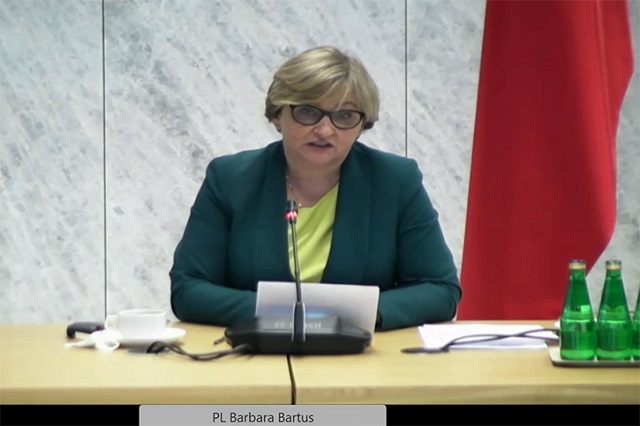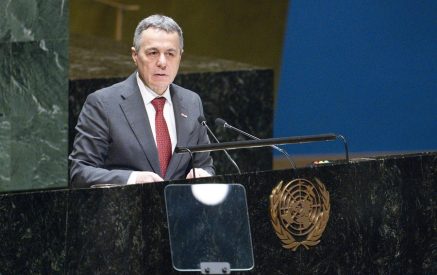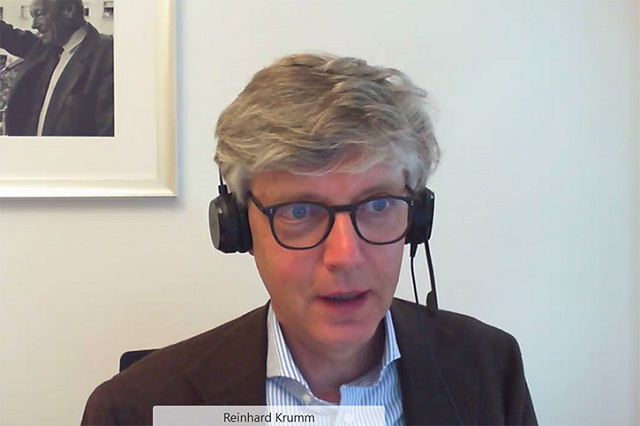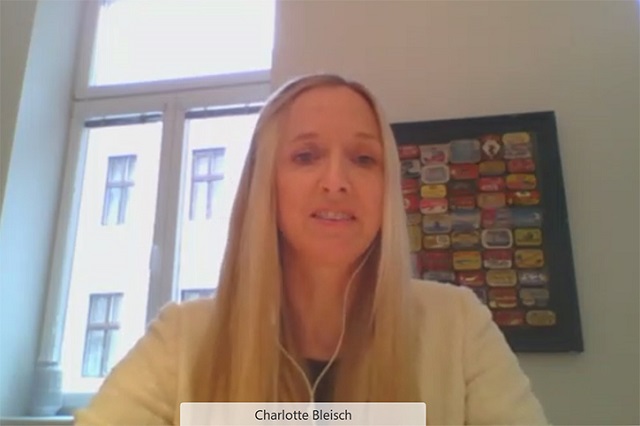COPENHAGEN, 5 May 2021 – Providing a platform for international dialogue is the core function of the OSCE, participants said today at an event organized by the Parliamentary Assembly, but meaningful dialogue is only possible when political will exists to engage in good faith. When existing international commitments are disregarded, it was emphasized, the result is not only damaged dialogue but also compromised security. In order to reverse this trend, it is important to improve the way that violations of OSCE commitments are addressed.
Today’s event was the third meeting of the OSCE PA’s “Call for Action – Helsinki +50 Process” initiative, and focused specifically on revitalizing dialogue in the OSCE. It featured keynote addresses by experts from the OSCE’s governmental side, the PA and civil society. OSCE PA Secretary General Roberto Montella and several former OSCE PA presidents actively participated, as well as a number other high-level OSCE officials, past and present. Following remarks by OSCE PA President Peter Lord Bowness, who provided an overview of the OSCE PA’s Helsinki +50 initiative, the discussion was opened by OSCE PA High-Level Expert Lamberto Zannier.
Ambassador Zannier began with a follow-up on the previous meeting of the initiative in March, when OSCE parliamentarians, representatives of OSCE executive structures and experts discussed the strengths and weaknesses of the consensus-based procedure in the OSCE’s decision-making bodies. Zannier stressed that by generating political interest in the OSCE in capitals, parliamentarians can increase the high-level governmental attention needed to ensure the strength and effectiveness of the organization.
Read also
Barbara Bartuś, Head of Polish Delegation to the OSCE PA, spoke about the threats to security, violations of international law and infringement of human rights that have put the OSCE to the test. Noting that providing a platform for dialogue is the OSCE’s primary task, she highlighted the inability in recent years to adopt political documents at the Ministerial Council as proof that there is work to be done to break the impasse. Parliamentarians are uniquely positioned to facilitate dialogue, she said, as they are relatively free from the constraints of government policies. “We should strive to achieve specific results,” Bartuś said, noting that the Helsinki Final Act’s 50th anniversary in four years will be a good time to announce tangible deliverables.
Reinhard Krumm, Head of the Friedrich-Ebert-Stiftung Regional Office for Cooperation and Peace in Europe, said that despite some notable setbacks in security, in particular the Ukraine crisis, the status quo is still relatively acceptable for most countries, which poses a challenge in focusing attention on an organization devoted to co-operative security. To increase political attention to the organization, it is essential for parliamentarians to engage in the process, he stressed, since parliamentarians are the intermediaries between the people and the decision makers. “The PA can bring the understanding that European security is under heavy threat and we have to do something about it within the framework of indivisible security,” Krumm said.
Kent Härstedt, Special Envoy of the OSCE Chairperson-in-Office and former Vice-President of the OSCE PA, spoke about the importance of remembering that dialogue has been valuable due to the commitments that governments have agreed to, including the sovereignty of States and their rights to determine their security arrangements, as well as human rights. Parliamentarians can play a role in ensuring respect for values and by promoting high-level dialogue. Harstedt also noted the growing significance of the PA in recent years. He noted in particular its recent work in promoting resolution of the political crisis in Belarus, noting that the PA was the first to offer a platform for dialogue between the government and the opposition.
Charlotte Bleisch, Senior Expert at the Office of the OSCE Secretary General, welcomed the conversation as important to help ensure that the OSCE is ready to tackle the challenges of the second half century of its existence. There is a special responsibility as the 50th anniversary of the Helsinki Final Act approaches, she said, to ensure the organization is fully equipped. To demonstrate the importance of the OSCE’s work, she emphasized the need to showcase success stories in the field and create a space for dialogue. National parliaments, she said, should exercise their oversight power to place pressure on governments to meet their commitments.
In the discussion, participants stressed the need for parliamentarians to place a big spotlight on the organization in their capitals, in order to improve the level of awareness and accountability. It is up to parliamentarians to meet with foreign ministries, it was stressed, as everyone in the Assembly shares a common responsibilitiy as a spokesperson for the OSCE.
Regarding the need to improve dialogue within the OSCE, it was stressed that this requires a lot of work, and that meaningful dialogue is only possible on the basis of respect for shared values. It is important in this regard to develop a new intellectual attitude towards the way that values are upheld, an attitude not based on arrogance or double standards, but instead on an improved posture when calling out the violation of commitments.
Others argued that the reality is that not all countries share the same values, and the emphasis must therefore be placed on improving respect for international law. It was also emphasized that the OSCE can learn from civil society organizations that engage in dialogue-building activities on a regular basis.
To watch the video of the event, please click here.
For more information on the OSCE PA’s “Call for Action – Helsinki +50 Process” initiative, please click here.
OSCE Parliamentary Assembly

























































